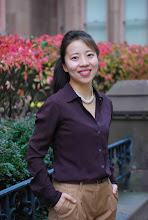My research projects and two educational ventures (Minds Abroad, Impact Abroad) have brought me to several conferences in the last two years: Association for Institutional Researches (AIR), University Technology Transfer Conference, Education and Venture Capital Summit (the first one was in Stanford in 2009 and it will be held in NYC this year by Berkery Noyes), NAFSA, ACTFL, etc. These several events were eye-opening and the discussions there I had with people different background were thought provoking.
Although it has been the last stage of my dissertation writing, I would like to come back here and write down what I have been learning from the real world every day. Some thoughts from the above mentioned conference experiences and also my investment experience in the past two years, cover a broad topic, while I will try to elaborate on each of them and develop them into blog writings here to share with my readers like you.
So here is the list of topics I am going to cover, in probably this coming year of writing:
1. Educational Entrepreneurship:
- How to define this newly popular concept?
- What matrix should we use for evaluation?
- What are the best practices I have seen so far in this field?
- Some experiences to share from my own investment.
- Whether and how VC funds want to tap on opportunities in this field?
2. Human Capital and the Growth of a Nation:
(This is about my own research so I have to make sure I am talking too much about this topic here)
- A unique face of globalization---international trade of "human" capital, brain drain, immigration and tech policies
- After Gary Becker, anything new in our understanding about human capital theory?
- Marriage, gender role, and the formation of human capital (yes mother is important!)
3. The Making of a New University
- "Is Harvard Replicable?" I hosted a table discussion with 20+ professors in the field of institutional research and presented a paper about this topic from an organizational development perspective in 2009, AIR conference.
- So many outdoor billboard advertisement about private universities in India, what does it mean? What does the India 2010 Foreign Investment in Higher Education Bill mean for India and for us?
- Chinese gov also published the new "National Policy" after the congressional meeting of 2010 about "opening educational field for foreign and private investment", what is happening now about this policy and what a market we will be seeing?
- With the presence of Google, Youtube, Ipod/Ipad, Twitter, and Ted, what kind of learning experiences are made for the 21st century college students? What will maintain in the old-style classroom teaching and what will change? What does a college education mean in the time of cloud computation?
4. China, India, Morocco, a Colombia? :
- With the expansion of my projects in China and India (doing business in this two countries is exciting and having staff in this two countries is rewarding! They are EXCELLENT!), and the new projects in Morocco and maybe very soon in Colombia, what kind of global citizenship am I obtaining?
- With the declining and even disappearing of the "demographic dividend" in China, what will happen in its educational market, labor market and what does it means for China's international role?
- What does the exam system work in China and when we see a student from China studying in the US, what does it mean? Who s/he is? What does s/he have gone through? I think the many NAFSAers might be interested to know the Chinese students that they have never seen, those who never got to come to study abroad in the US.
- Investing in China v.s. India (and managing the team there) lessons and tips to share
- Outside of the growth gravity center (OECD and BRIC countries), but where different civilizations meet each other (Morocco, and Colombia in some sense), do the principles we learned here (about market mechanism, parental investment behavior in children, ROI of education, peer effect, matching issues in labor market, etc.) apply to people's life there?
- And many more other thoughts under a comparative perspective.
When I feel "emotional" sometimes, I might share some photos, music, poems, or some bad jokes. My figures are crossed for myself to not come here but only complain too much about how stressful it is to work on a doctoral dissertation!


